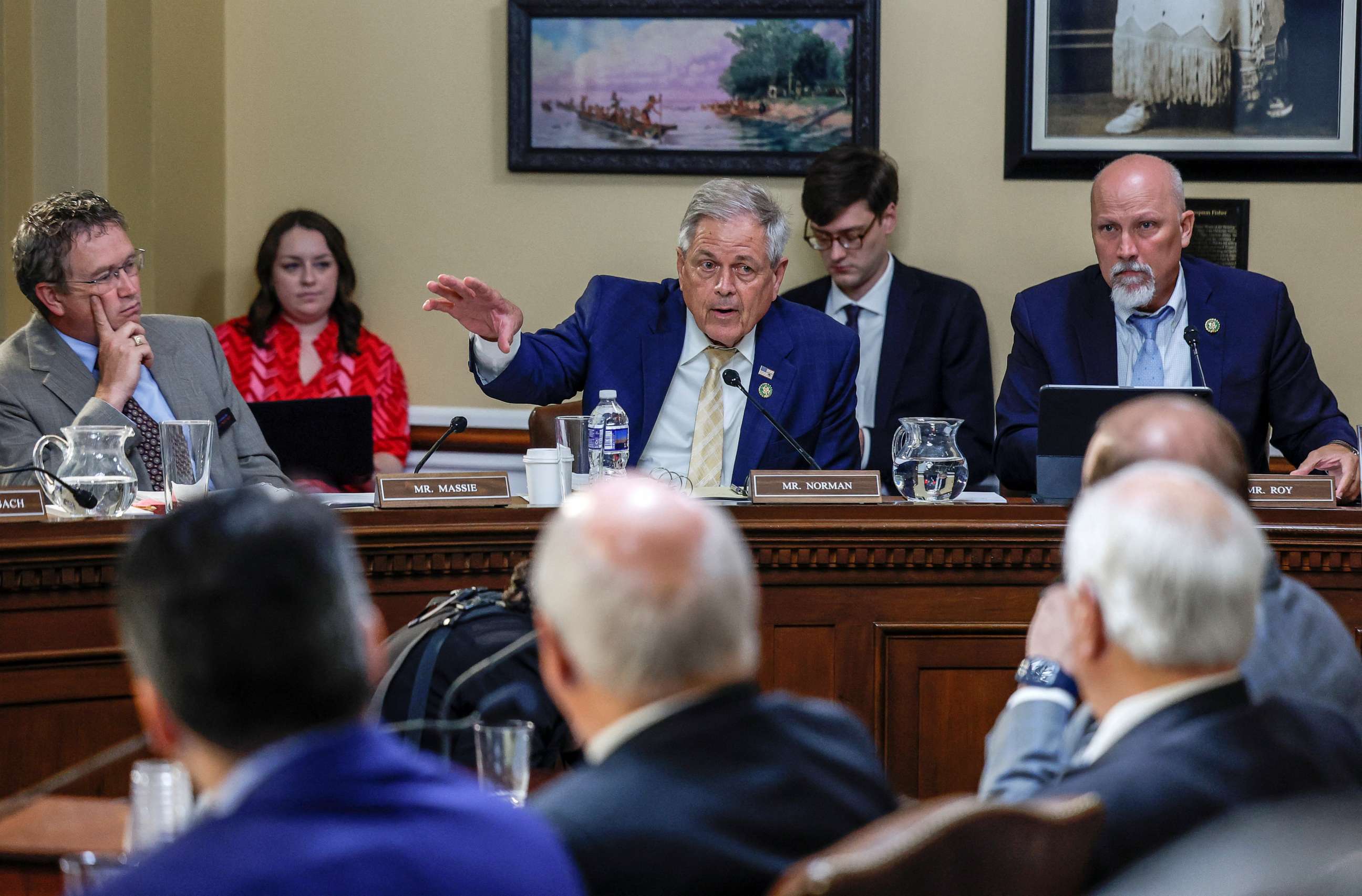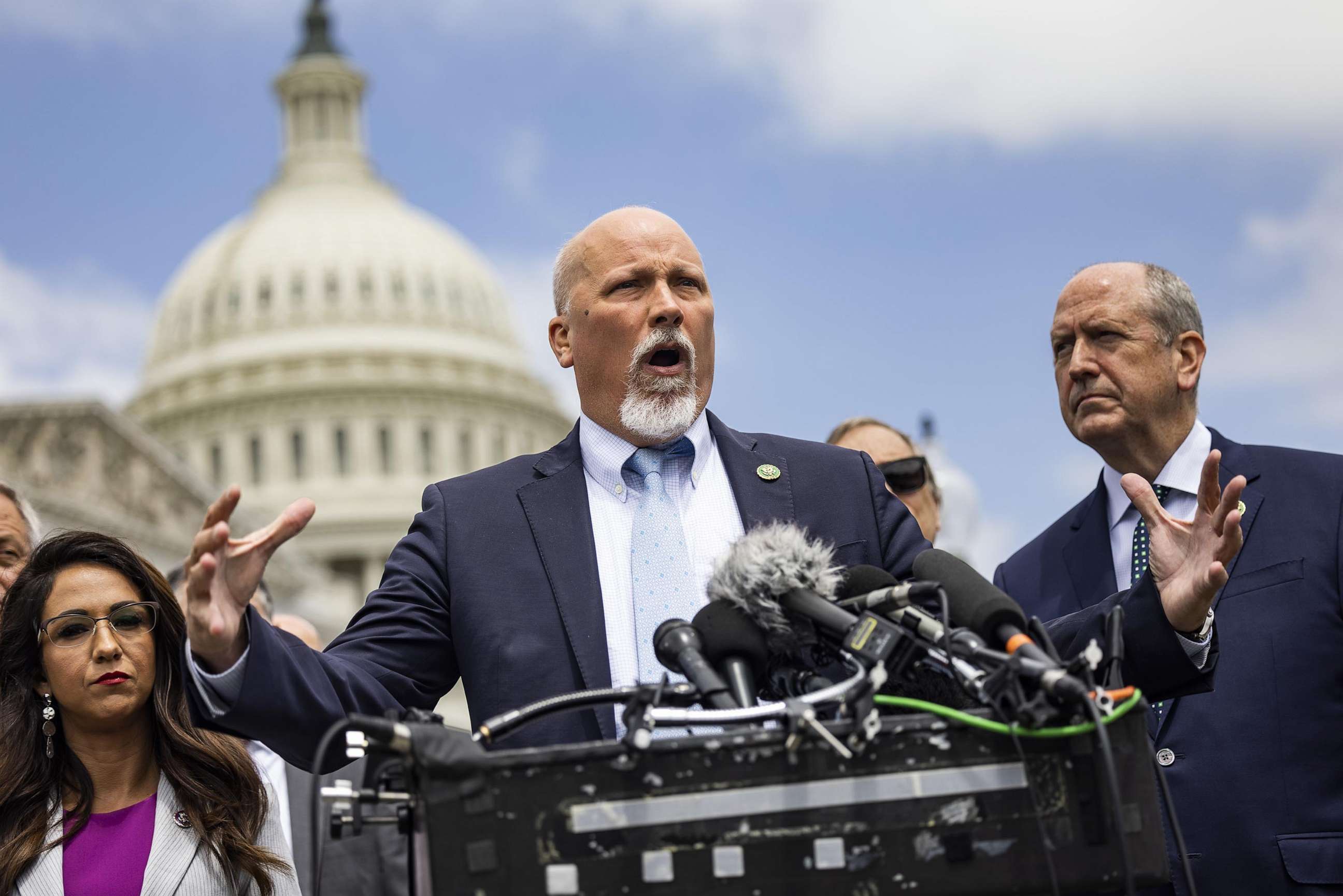Debt ceiling deal to prevent default narrowly passes 1st big test in key House committee
In a win for GOP leadership, Rep. Thomas Massie backed the rule.
The debt ceiling deal brokered by President Joe Biden and House Speaker Kevin McCarthy cleared a major procedural hurdle on Tuesday night, just days before a potential default by the U.S. government.
The House Rules Committee gave the green light for the Fiscal Responsibility Act to advance to the full House so members can hold a planned vote on Wednesday night before sending the legislation to the Senate ahead of Monday’s default deadline.
The panel advanced the bill to the floor for debate in a narrow 7-6 vote.
In a big win for Republican leadership, Rep. Thomas Massie of Kentucky -- a GOP hard-liner and fiscal hawk -- voted in favor of the rule.
"Today's bill is a product of compromise and reflects the realities of a divided government," Oklahoma Republican Rep. Tom Cole, who supported the rule for the proposal, said as he began the meeting.
In his own remarks, Massie said, "My interest in being on this committee was not to imprint my ideology. I think that is an inappropriate use of the committee." He later told reporters he planned to vote for the deal on the floor.
The other House Freedom Caucus members on the committee, Reps. Chip Roy of Texas and North Carolina's Ralph Norman, vowed to try to block the bill from moving forward and ultimately voted against the rule, along with the four Democratic members.

"Not one Republican should vote for this deal. It is a bad deal," Roy said earlier Tuesday at a House Freedom Caucus press conference.
He also issued a veiled threat that there could be consequences if the deal goes through.
"We will continue to fight today, tomorrow," Roy said. "And no matter what happens, there's going to be a reckoning about what just occurred, unless we stop this bill by tomorrow."
Rep. Scott Perry, the chairman of the House Freedom Caucus, dodged questions at the news conference on whether he'd support a motion to vacate -- a rule that would allow any House member to force a vote to attempt to remove the speaker.

"I'll let each member speak for themselves. For me, I am focused on defeating this bill. What happens post that, and the agreements we have, we will decide once we determine the disposition of the bill in its finality," Perry said.
McCarthy shrugged off the criticism from those in his party, specifically some who claim the party was "outsmarted" by Democrats.
"How were we outsmarted, the largest cut in the history of Congress, the biggest ability to pull money back?" McCarthy said.
Getting the bill through Congress will hinge on support from moderates in both parties. The White House and Republican leaders have been holding calls and briefings to sell the deal, with more meetings planned, ABC News has reported.
Lawmakers face a time crunch to pass the debt ceiling deal because Treasury Secretary Janet Yellen has warned the "X-date" -- when the government could run out cash to pay all its bills in full and on time -- could happen as early as June 5.

House Minority Leader Hakeem Jeffries said Tuesday Republicans have said they will deliver 150 votes from their party, and "House Democrats will make sure that the country does not default."
The New Democrat Coalition, made up of roughly 100 House Democrats, has endorsed the debt ceiling deal.
Asked about the vote tallies, Office of Management and Budget Director Shalanda Young (a key negotiator in the debt talks) stopped short of declaring victory, telling reporters she'd leave that to Congress.
"All I know is when you enter into good faith negotiations, you don't negotiate to see a bill posted," she said at the daily White House briefing. "You negotiate to make sure it gets to the president's desk and we'll fulfill our part when it gets to the president's desk."
The Fiscal Responsibility Act includes a two-year government budget in exchange for lifting the debt ceiling through Jan. 1, 2025. The bill would keep non-defense spending flat in fiscal 2024 and increase levels by 1% in fiscal 2025.
The nonpartisan Congressional Budget Office on Tuesday night released its score -- or fiscal analysis -- of the debt ceiling deal, estimating that it would reduce the federal deficit by $1.5 trillion over 10 years.
The interest on the public debt in that time period would also decline by $188 billion, according to the CBO.

Senate Majority Leader Chuck Schumer, D-N.Y., has said his chamber will take up the bill as soon as it passes the House. He advised his colleagues to prepare for possible Friday and weekend votes if there's not unanimous cooperation.
If there's a filibuster, it could push the chamber past the June 5 default deadline. Sen. Mike Lee, R-Utah, previously threatened to "use every procedural tool at my disposal to impede a debt-ceiling deal" he didn't agree with.
Schumer and Minority Leader Mitch McConnell, in a rare moment of unity, both praised the debt limit deal in floor remarks on Tuesday.
"I support the bipartisan agreement that President Biden has produced with Speaker McCarthy. Avoiding default is an absolute imperative," Schumer said.
McConnell said while no one got everything they wanted, "the American people got a whole lot more progress towards fiscal sanity than Washington Democrats wanted to give them. Speaker McCarthy and House Republicans deserve our thanks."
ABC News' Ben Gittleson, Molly Nagle, Rachel Scott and Trish Turner contributed to this report.




